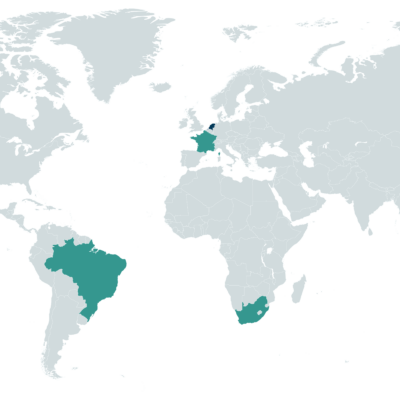FOUNDATIONAL – transFOrming rUral laNDscapes And communiTIes thrOugh NAture-based soLutions: integrating biodiversity conservation and human well-being at the nature-agriculture interphase
Call
Duration
01/02/2025 – 31/01/2028
Total grant
Approx. 860 thsd. €
More information
Pablo Tittonell
p.a.tittonell@rug.nl
Partners of the project
- Groningen Institute for Evolutionary Life Sciences (GELIFES), University of Groningen, Groningen, The Netherlands.
- Department of Microbiology, Stellenbosch University, Stellenbosch, South Africa
- Department of Soil Science, Federal University of Viçosa, Viçosa, Brazil
- Vineyard Health and Agroecology (SAVE), French National Institute for Agricultural Research, Villenave d’Ornon, France

Context
In agricultural landscapes, NbS geared to the design and management of sustainable, multifunctional ecosystems require innovative planning. Such landscape planning, and the modification of practices, involves trade-offs between competing claims for natural resources and land uses, as well as the aspirations, interests, and goals of different (local to global) actors. At the same time, transitioning from current to sustainable multifunctional landscapes offers new opportunities to create synergies between bio(cultural)diversity conservation and human well-being. In the context of the new European Green Deal and the 2022 UN Food Summit declaration, it is expected that agroecology and regenerative agriculture will increasingly permeate national policies and political discourses, in a quest to address the major challenge of global food security while addressing biodiversity conservation and tackling other societal challenges such as climate change adaptation/mitigation. The FOUNDATIONAL project is thus timely, helping refine the national vision and missions around sustainable farming based on NbS and encouraging the uptake of these practices among farmers and citizens.
Main objectives
To inform policy, conservation, and development efforts, FOUNDATIONAL explores the landscape-level implementation of NbS and their implications to improve biodiversity status and ecosystem services at the landscape, local and micro scales, as well as human well-being in terms of food security and sovereignty, nutritional diversity, social inclusion, and sustainable rural livelihoods.
SO1: Assess how transitioning towards NbS improves biodiversity status at micro- (soil), meso- (plot, farm) local and landscape scales;
SO2: Evaluate social-ecological trade-offs and synergies at the landscape level that may facilitate or hinder NbS implementation;
SO3: Engage stakeholders, with a focus on local communities that have a stake in the landscape, to co-develop strategies for facilitating NbS implementation.
Main activities
FOUNDATIONAL explores the transformative power of agroecology and regenerative farming as NbS across three continents – Latin America (Brazil), Africa (South Africa), and Europe (France). The selected rural landscapes include highland coffee-based systems intermingled with relics of Atlantic Forest in Brazil, wheat production in South Africa’s Western Cape, and vineyard-dominated landscapes in south-western France. These landscapes differ in their social-ecological context, levels of NbS promotion by governments and social organisations, degree of stakeholder engagement, and degree of adoption by farmers.
